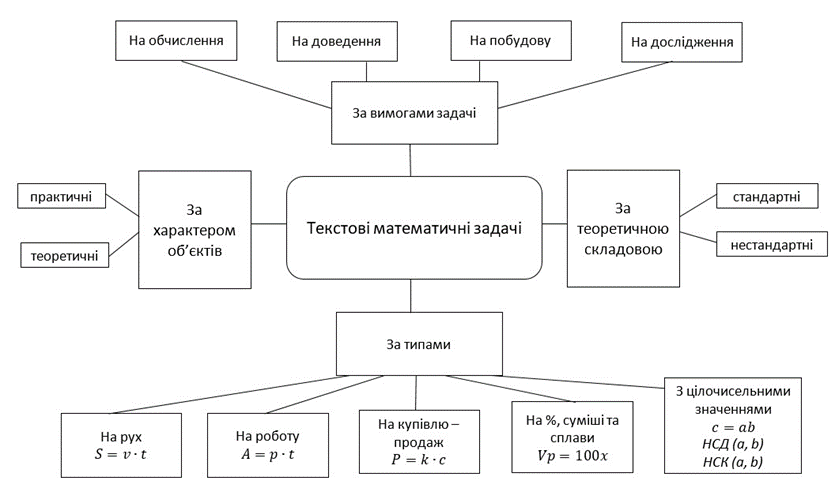Theoretical and methodological basis of studying the topic «word problems of practical content» in the school course of mathematics
DOI:
https://doi.org/10.15587/2519-4984.2023.294828Keywords:
mathematical model, mathematics, ord problems of practical content, classification of problemsAbstract
In modern schools, we often encounter the problem that students lose interest in learning. Tasks of practical content are designed to increase interest in school mathematics education.
The orientation of the research of problems of practical content involves the orientation of methods in the process of solving problems and the formation of strong skills of independent activity in schoolchildren and the education of persistent interest in the subject. Also, practical tasks help to highlight interdisciplinary connections, make you delve deeper into theoretical aspects, and form a complete picture. In the process of solving such problems, students develop cognitive, informational and social competence. Learning becomes useful and, at the same time, exciting and interesting for students.
Word problems in the school mathematics course play a very important role and are divided by functions, by the requirements of the task, by types. The article is devoted to the analysis of the theoretical and methodological foundations of problems of practical content and their solution.
The purpose of the work is the classification of text problems according to various parameters based on the analysis of scientific and methodological literature on this topic. Word problems of such types as movement problems, work problems, buying and selling problems, interest problems, mixtures and alloys are selected for consideration. The main results of the publication include recommendations for creating a mathematical model of the problem condition using tables, depending on its type.
Problems of various types are presented, which are solved by constructing a corresponding mathematical model of the problem condition. This approach to studying the topic "Word problems" is used in my own experience of teaching mathematics
References
- Shapovalova, N., Panchenko, L., Kuchmenko, S. (2019). Scientific and Methodological Specifics and Benefits of Studying Mathematic Modeling by High School Students. Osvita. Innovatyka. Praktyka, 1 (5), 31–39.
- Besedin, B., Zhadan, O. (2021). Using applied content tasks to study mathematics in high school. Humanizatsiia navchalno-vykhovnoho protsesu, 1 (100), 88–98.
- Verschaffel, L., Schukajlow, S., Star, J., Van Dooren, W. (2020). Word problems in mathematics education: a survey. ZDM, 52 (1), 1–16. doi: https://doi.org/10.1007/s11858-020-01130-4
- Nepomnyascha, H. (2018). Training the intending primary school teacher to work over the problems while studying methodics of mathematical. Bulletin of Oleksandr Dovzhenko Hlukhiv National Pedagogical University. Series: Pedagogical sciences, 37 (2), 196–202. doi: https://doi.org/10.31376/2410-0897-2018-2-37-196-202
- Mykhailenko, L., Kovalchuk, M. (2016). Solving text problems as a mean of formation of mathematical competence among senior pupils. Suchasni informatsiini tekhnolohii ta innovatsiini metodyky navchannia u pidhotovtsi fakhivtsiv: metodolohiia, teoriia, dosvid, problemy, 46, 65–69.
- Sliepkan, Z. (2006). Metodyka navchannia matematyky. Kyiv: Vyshcha shkola, 582.
- Ister, O. (2022). Matematyka. HENEZA, 316.
- Zakharchenko, N. (2017). Tekstovi zadachi v zavdanniakh ZNO. Available at: https://maimo.elit.sumdu.edu.ua/images/stories/docs/tekstovyye-zadachi.pdf
- Kozyra, V. (2021). Zbirnyk zavdan z matematyky dlia pidhotovky ta provedennia derzhavnoi pidsumkovoi atestatsii u formati ZNO. Aston, 128.
- Skvortsova, S. (2016). Zadachi na rukh: metodyka provedennia pidhotovchoi roboty. Uchytel pochakovoi shkoly, 6, 7–11.

Downloads
Published
How to Cite
Issue
Section
License
Copyright (c) 2023 Kateryna Hryhorieva, Tetiana Turka, Zoya Pashchenko

This work is licensed under a Creative Commons Attribution 4.0 International License.
Our journal abides by the Creative Commons CC BY copyright rights and permissions for open access journals.
Authors, who are published in this journal, agree to the following conditions:
1. The authors reserve the right to authorship of the work and pass the first publication right of this work to the journal under the terms of a Creative Commons CC BY, which allows others to freely distribute the published research with the obligatory reference to the authors of the original work and the first publication of the work in this journal.
2. The authors have the right to conclude separate supplement agreements that relate to non-exclusive work distribution in the form in which it has been published by the journal (for example, to upload the work to the online storage of the journal or publish it as part of a monograph), provided that the reference to the first publication of the work in this journal is included.






